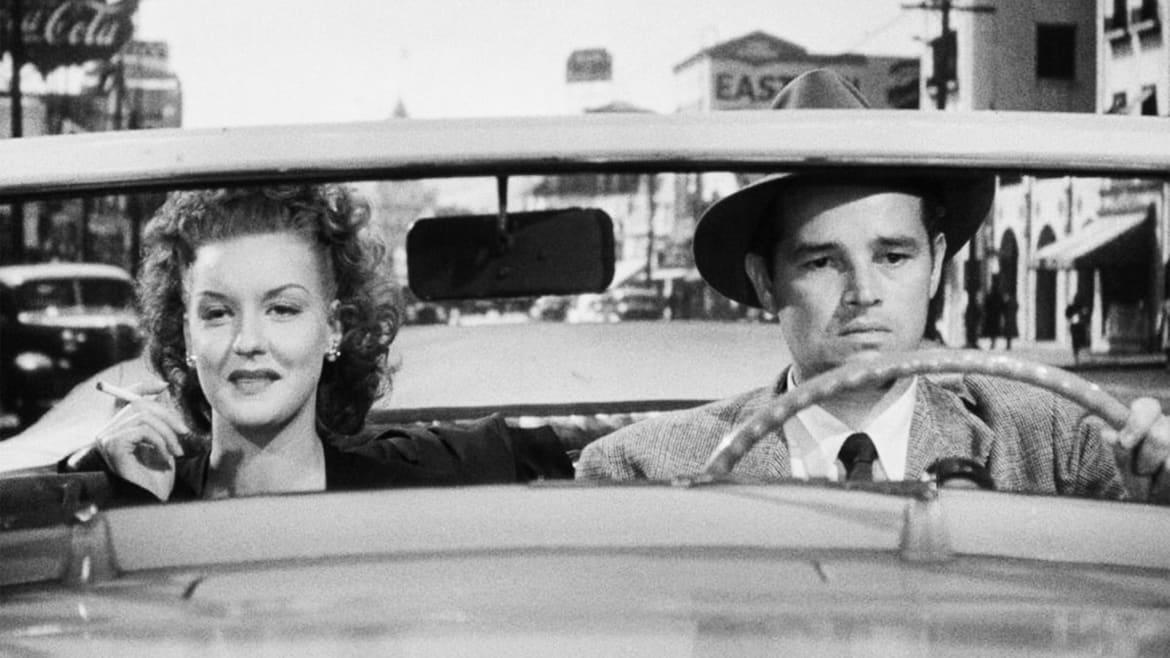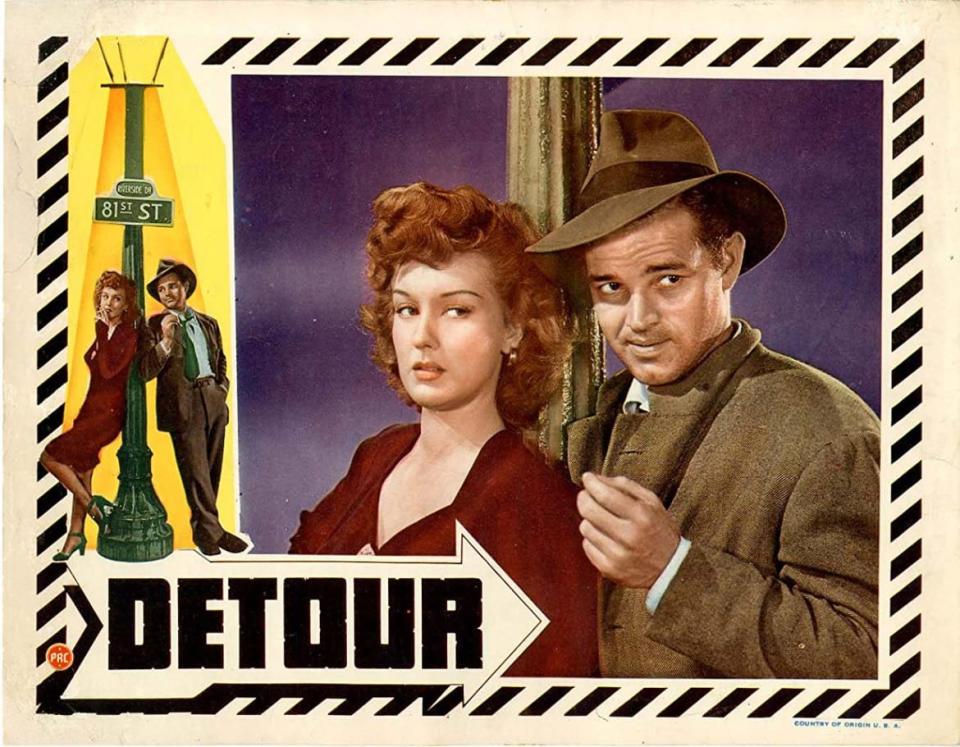‘Detour’ Still Takes the Fast Lane to the Dark Side of Life

The Film on the Cutting Room Floor
‘They are literature’s cold cases, the Missing and Presumed Dead. They are the unlucky novels and stories that inspired movies so successful that they eclipsed the originals almost completely. Some books weather a subsequent movie’s success. Gone With the Wind survives as a classic film and a classic novel. But how many people know that before it was a movie, The Birds was an extraordinary novella by Daphne Du Maurier, or that Forrest Gump is based on the novel Forrest Gump?
Good fiction deserves a better fate. By way of a modest corrective, this series seeks out and showcases those obscured, forgotten novels and stories that gave their lives that movies might live, stories that were always at least as good as the well-known films they inspired and in more than a few instances, a lot better.
Speaking to Peter Bogdanovich, movie director Edgar G. Ulmer described the source novel for his 1945 film Detour as a “very bad book.”
Ulmer made Poverty Row quickies in the ’30s and ’40s, but with the chops of a legit auteur. Detour became a classic of the noir genre—a cynosure for what one could realize even on the most famished budget—and Ulmer was not a one-trick pony: horror buffs celebrate his 1934 terror effort The Black Cat as perhaps better than Dracula or Frankenstein.
Alas, Ulmer was tantamount to a human anvil in the “I wouldn’t trust him as far as I could throw him” game, telling anyone, for instance, that when he was in Germany, F.W. Murnau and Fritz Lang wouldn’t have gotten anywhere without his help, and that Martin Goldsmith, the man who penned the novel that led to Ulmer’s greatest film, was a lousy hack writer.
American Dreams: How Chester Himes Invented Noir
The Criterion collection has recently put out a restored version of Detour, which has existed for an age in public domain copies that, frankly, look like ass. Having looked fuzzy for years on those frowsy, sub-bootleg copies, what you see now is Ulmer’s brilliance for composition, blocking, his gifts with depth of field, and a kitchen sink-style of editing that renders him the Eisenstein of noir.
But if you’re the kind of person who wonders where a great film began its proper life, you should check out Goldsmith’s 1939 novel, which adds the subtitle An Extraordinary Tale, a self-applied honorific that the book more than earns. Because this is a case where the novel is even better than the movie it inspired.
There are differences between the novel and the film, but they share a similar gist. (It’s funny that Ulmer ripped Goldsmith, considering that the novelist also wrote the screenplay for the film, which Ulmer seemed to have no problem with, or else he would have let everyone know.) Goldsmith was born in 1913, and pulpy noirs were his game. He also wrote The Narrow Margin, which inspired maybe our ultimate train-set noir, which in turn inspired early sequences of A Hard Day’s Night and also some Twilight Zone episodes.
Detour’s linear plot moves from the East Coast to the West Coast, in more or less a straight line. The ostensible protagonist is Alex, who plays violin in New York City juke joints (in the movie, he’s a pianist), after dropping out of music school. Alex is in love with Sue, who works at his regular club. They both tell this story in alternating first-person sections.

Sue is sick of New York and maybe a little bored with her beau, who’s mostly a decent sort, although maybe a little too possessive. He pops a guy at the club who gets grabby with Sue, who leaves not long after for Hollywood to try and become a star. Nowadays she’d probably just get a YouTube channel, but this being 1939, you went west, not because Horace Greeley told you to, but because you hoped David O. Selznick might care. Having lost his club gig and horny for Sue, Alex too lights out for California.
The plot is perfect for a film that clocks in at just over an hour, which is what you wanted from a B-movie at the time (B-movies were routinely part of double features, hence their shorter running time). Once on the road, Alex runs out of money fast, so he has to hitchhike, eventually getting picked up in a convertible driven by a guy named Haskell. Initially, Haskell appears to be rich, but he’s really just a Florida bookie who’s lost most of his wad and thinks he can score some money closer to his home. He seems like an all right guy—he even buys his hungry passenger a steak—but he has these nasty gashes on his forearm, courtesy of a woman, and a tale of having poked a kid’s eye out with a dueling saber when he was a child, which caused him to run away from home. He also smokes a lot of weed, something not in the film.
Goldsmith was a shrewd writer. “Haskell was driving without his sunglasses and I noticed that his eyes looked sleepy,” Alex narrates. There’s an accumulation of these details about Haskell—ashen skin (both men are somewhere in their early thirties), puffiness in the face that comes and goes. It’s like an index of symptoms of heart problems from a medical website, but it’s very subtle.
The novel’s turning point—or the point where things truly go south—occurs in a scene where it starts to rain while Alex is driving and Haskell is sleeping. Alex stops the car to put up the top. When he tries to wake Haskell by opening his door, the bookie falls out and hits his head on a rock. He’s dead. Problem! He probably had been dead for a while, but it looks now like Alex bashed him one, and this sets in motion the cycle of Calvinism-on-steroids that becomes the plot’s tyrannical driver.
Meanwhile, Sue has made it to Los Angeles, where she works at a drive-up eatery and beds lesser Hollywood stars in hopes of meeting someone more useful. Goldman nails Sue’s narrative voice so beautifully that if you’re ever tempted to argue that male writers can’t do a first-person female voice, consult Detour. “It rankled me because he hadn’t offered me a cigarette before lighting one for himself. I didn’t really want one, but who wouldn’t be irritated to think that once somebody had you he was taking you for granted?” If anything, Goldman is better doing Sue than Alex, and Alex’s voice is strong enough to sustain the whole novel.
There’s nothing expurgated about Detour’s world view. After Sue shacks up with a guy who’s basically a glorified extra, she repairs to the bathroom to masturbate because she didn’t climax during sex, and to douche, in hopes that she doesn’t get pregnant. This is no nonsense stuff. Men “can quickly forget things they prefer not to remember, and no matter what it is they have done, there are scarcely any distasteful after effects, recriminations or—worse yet—abortions.”
Meanwhile, in the parallel narrative, Alex rolls Haskell into a ditch and takes his clothes, his money, and his identity. But if Alex isn’t a saint, neither is he a heel. Goldsmith wants us to ponder how bad our luck can go, how we can be a chew toy of the universe. And what do you do when that happens? Do you fold as a moral person? Do you seek to reroute and become immoral yourself so as to profit? Do you panic and fall apart? Do you rally and grow, as life paddles your ass and stops up your mouth?
The twin narratives ultimately suggest two roads going in different directions. One takes you one way, the other somewhere else. What Alex sees as his final destination is not what Sue sees. She hates the man—Raoul—from her tryst. She calls him a lousy lay who blew his load in seconds. This is a vain, good-looking man with no acting ability, who knows he is going nowhere in Tinseltown, so he tries to fling himself off the Hollywood sign. He lives, Sue visits him in the hospital, and she decides that she probably loves this guy, so see you, Alex. We all know a Sue. Raoul will just be an emotional pit stop for her, then it’s on to the next.
But Sue is the least of Alex’s troubles. His new consuming problem is that he picks up the girl—Vera—who slashed Haskell’s forearms with her nails. Of all the gin joints in all the world, right? Vera knows what he’s up to, and whether or not he killed Haskell does not interest her at all.
In the Ulmer film, Vera is played by the appropriately-named Ann Savage.
She is one of the scariest characters you will encounter in all of noir. You know how Richard Widmark had evil energy as Tommy Udo in Kiss of Death (1947)? Ann Savage had more as Vera. She gets it, in part, from Goldsmith’s prose. “She could finish me, if she chose,” Alex remarks. They’re going to sell the car, she’s going to pocket all of the money, until she sees that Haskell’s super rich dad is dying not far from where they end up in California, and she wants Alex to impersonate Haskell and get written into the will. They are holed up in a room, hating each other more and more, with Vera getting increasingly angry that Alex doesn’t want her physically. It all culminates in a sex scene that’s hard to characterize. Hate sex? Death sex? In the end, Alex kills her, after she gets drunk and tries to call the cops, not because of her morals, but rather because of inchoate rage. Meanwhile, Sue thinks Alex is dead, after Haskell’s body is discovered with Alex’s wallet on him, and the two never meet again.
In the film version of Goldsmith’s story, Alex is picked up eventually by the cops in a druggy, dreamy coda to the story proper (under Hays Code rules, no one in a movie was allowed to get away with murder). In the novel, he remains free. Or is he?
He’s limited in where he can go, but, Goldsmith implies, who the hell isn’t? We often talk about life as a road, or journey along one, which is as anodyne as thinking Rainbow Brite is going to pop out of nowhere and save you when things get tough. Goldsmith shows us the real road of life, the one clotted with detours and reroutings and yellow signs that tell you there’s roadwork ahead and you need to find another way. Only, no one has yet made the GPS that can guide you in these matters, and Triple A ain’t coming to your rescue.
Get our top stories in your inbox every day. Sign up now!
Daily Beast Membership: Beast Inside goes deeper on the stories that matter to you. Learn more.

